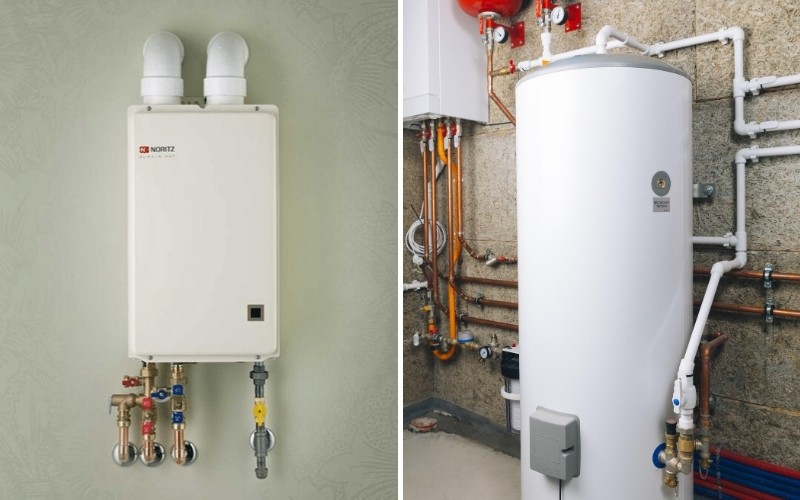There are a few reasons why you might be pondering the choice of a traditional water heater versus a tankless model. The most common reason for this decision is that you are building a new home and must decide what type of water heating appliance to install. Many homeowners begin thinking about the pros and cons of both types of water heater when they are purchasing a replacement unit. But regardless of the reason for your research, it is crucial to understand all of the pros and cons of both water heaters to make a well-informed decision.
Traditional Or Tank Style Water Heater
These are the units that most people had in their homes growing up. There is a large holding tank that heats and maintains the water at a set temperature. When any hot water faucet or shower is turned on, the tank supplies the needed hot water. Traditional water heaters can be powered by electricity, natural gas, or propane.
The size of the holding tank is a critical piece of information with traditional water heaters. It determines how much hot water is available to your household at any given time. Once the hot water in the tank is used, you must wait for the tank to refill and heat more water. This time needed to heat more water is sometimes called refresh time. Typically, residential water heater tanks range from 30-100 gallons, and the units have a life expectancy of about 12 years.
PROS
- Traditional water heaters usually are cheaper to purchase and install
- These units are relatively simple to maintain and require little care other than an annual draining
- Can supply the entire house with hot water
CONS
- Traditional water heaters can only supply a limited amount of hot water; when the tank is empty, you must wait for a new tank of water to be heated
- Traditional water heaters are not very energy-efficient
- They have a shorter lifespan than tankless water heaters
Tankless Water Heaters
As the name implies, these units have no holding tank. Instead, they heat the water only on demand. When you turn on a hot water faucet or shower, the water is heated as it flows through the water lines to the spigot. These units can be powered with electricity or gas and are much more compact than a traditional unit.
Because the water is heated as it flows through the water lines, it is considered an unlimited supply of hot water. As long as the faucet is open, hot water is constantly being heated. The average tankless water heater should serve your home for 20 years, reliably.
PROS
- Longer lifespan than a traditional unit
- Unlimited supply of hot water
- More energy efficient because there is no holding tank of water to be maintained at a specific temperature resulting in lower operating cost
CONS
- Tankless units are more expensive to purchase and install
- There is a limit to the amount of hot water each unit can produce simultaneously
Which Is Better?
No one water heater is best for everyone. A large family will benefit from a tankless water heater as the supply is somewhat unlimited. There are no concerns about running out of hot water before everyone can shower. If you are environmentally concerned, the tankless is also a better choice because of the lower energy consumption. However, the traditional unit is more cost-effective to purchase and install if you are on a tight budget.
For help selecting the best water heater for your home, call (720) 740-0452. The pros at Royal Plumbing will help you make a well-informed choice.

